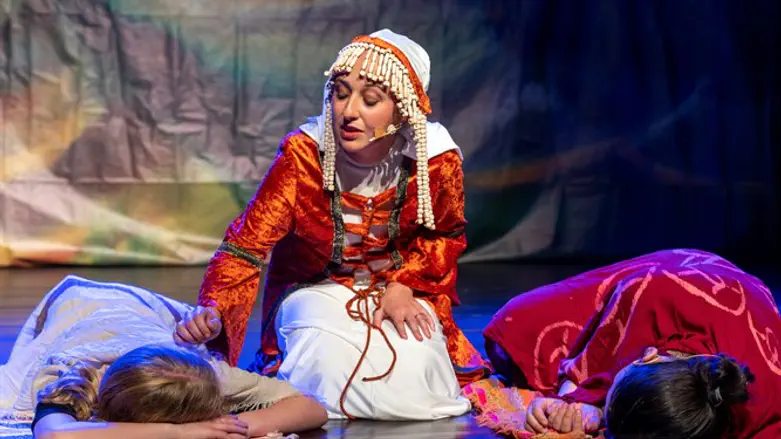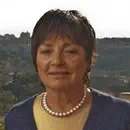
The Book of Genesis tells us little of the feelings of the characters who take center stage in the early years of the eternal saga of the Covenant between G-d and the Jews. It is unusual when emotions are cited – an often-cited notable exception that proves the rule is the beautiful verse that tells us that Jacob loved Rachel and the verse in which it says that the seven years of work for Laban seemed like just a few days to him because of his love for her.
There is so little conversation or small talk in the Torah that the Sages ask how it can be that the story of Eliezer and Rebecca is narrated twice - once as it takes place and second as the servant tells his master what occurred.
That sparseness is what makes it a daunting task to write a play about these larger than life figures. Every choice of word in the Torah is fraught with meaning, making an authentic play a work of careful scholarship as well.
An observant playwright cannot fill in the gaps between the lines of Torah verse at will, but the midrashic literature and rabbinic commentaries serve as a rich source for the psychology and feelings of Biblical protagonists. One of my favorite examples of the use of midrash for this purpose has always been an essay by Rabbi Adin Steinsaltz zt"l, which I taught for years before Rosh Hashannah, about Abraham and Yitschak as they make their way to the mountain where the Akeida is to take place. The essay is a chronicle of their conversations, thoughts and emotions, and has a bibliography citing a midrashic source for each idea, whereas the Torah tersely tells only the barest facts of this epic event.
As of this week, when I travelled to Gush Etzion to see it, the musical drama "Rebecca! Mother of Two Dynasties," has become another.
This play, written by Toby Klein Greenwald (who is also director) and Tamar Kamins, is emotionally gripping, clever and sometimes funny – in the tradition of 'Raise Your Spirits' Theater Group's previous eleven productions over the twenty years since its founding in 2001 during the second Intifada. Elisheva Naomi Savir is musical director and choreographer is Ashira Allon, talented young women whose names I am sure theater lovers will be seeing in the future, along with Mitch Clymen who is responsible for the outstanding music and arrangements.
"Rebecca!" uses midrash to enrich the script spoken by the players, this in addition to one actress reading the relevant psukim (Torah verses) and another, playing a troubadour, reciting the midrash and commentaries (by name) when deemed necessary.
I particularly enjoyed way the story of Esau selling his birthright for a mess of pottage was done – the midrashim about Jacob cooking lentil soup because his grandfather Abraham has died and Esau going out to kill the great hunter Nimrod instead of being at home to mourn, are seamlessly interwoven with the Torah verses describing Esau's valuing the birthright less than assuaging his ravenous hunger. The whole dramatic scene is lightened by the performance of the group of young cast members dressed as lentils (they are cast just as engagingly as angels, Eliezer's camels and Jacob's sheep at other points in the play).
Most poignant is Rebecca's song as she puts her so very different twins, Esau and Jacob, to bed. What mother does not wonder, as she does, how it can be that she acts with the same understanding and love towards each child only to discover that they understand her words and actions differently from one another, that they turn out to be vastly different human beings, that some do not share the values she has tried so hard to inculcate.
The Torah's minimalistic emotional content makes another exception when Rachel cries out to Jacob that she will die if she remains barren. This is the basis for a beautiful but wrenching song in which she pours out her heart in one of the best scenes in the play, to my mind. It is full of raw emotion, immensely realistic for anyone who has seen the anguish of infertility. It is also one of several places in the production in which the importance of the love and respect between husband and wife, the place of the traditional family and desire to raise children are portrayed as basic values.
There are many more riveting scenes as the play is made up of vignettes describing the lives of the patriarchs from the Akeida (binding of Isaac) up to Jacobs' split with Esau upon his return to Canaan with his family, each with its own lively acting, dramatic content, and musical interest. Especially insightful is the clearly stated message that Esau and Jacob can make peace with one another but have to go their separate ways until some future time when their being together can work.
And hovering above the stage, throughout, is the echoing response of Rebecca who leaves her home for a far off land in order to bind her life to that of Isaac. "I will go" she declares with resolve, bravely facing the unknown, to my mind symbolizing what the women watching the play have said at so many points in their own lives, some in moving to Israel and some in making choices about how and where to live their lives in the Jewish state. And "Here am I" she cries, in the voice of Jewish men and women through the ages, the timeless expression of loyalty to G-d and nation that began with Abraham.
The play is for women only for halakhic reasons, this adding a feeling of camaraderie among the audience and identification with the Matriarchs, rather than serving as a limitation. My teenage granddaughter Bahr loved it and so did I. I was so glad she saw superb theater based on careful adherence to Torah and filled with faith and wisdom, adding to her admiration of the Mothers of Israel. This is especially effective since those messages are subliminal and there is no sermonizing. In fact, some of the songs are jazzed up and rhythmic, sung as the audience began spontaneously clapping and stomping along. If you have adolescent granddaughters or daughters, you do not want to miss this play (scroll down on link for Jerusalem dates on June 20,21 at Begin Heritage Center)
Interestingly the Raise your Spirits Theater Group has developed traditions in its two decades of productions. Each performance is preceded by a young member of the cast reading a chapter of Psalms and ends with the audience rising for Hatikvah and Ani Maamin. The program booklet always thanks everyone who took part, going from those who helped with costumes and scenery to maintenance staff and those whose Torah knowledge was indispensable, such as scholars Dr. Bryna Levy and Erella Yedgar - and of course, the many volunteers.
This time, the group is performing its first play after coping with corona and managing to rehearse using zoom and infrequent meetings when allowed. The actresses are from all over the country, so directors were prepared for the possibility of actresses running to the bomb shelter with their children in the midst of a rehearsal. Thus it was most fitting that everyone joined in reciting the Shehecheyanu blessing, in keeping with the halakhic decision of Efrat's Chief Rabbi Shlomo Riskin (Rebbetzin Vicky's clothing gmach provided some of the costumes), who said that thanking G-d for the end of the corona pandemic is an obligation – and indeed, a most welcome one for enabling us to go back to enjoying theater as it should be - well written, well acted, inspiring, interesting and memorable..


.


.


